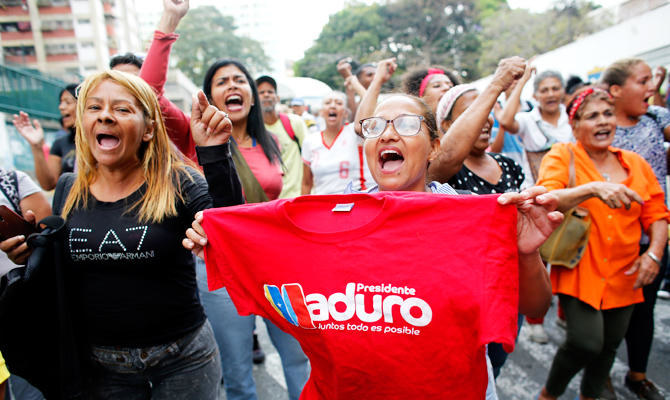CARACAS: The International Federation of the Red Cross and Red Crescent Societies said on Friday it was prepared to channel humanitarian aid to Venezuela through an operation that could be similar to one in Syria, potentially helping ease chronic hunger and disease in the South American nation.
President Nicolas Maduro in February blocked efforts by political opponents to bring US-backed aid into the country across its borders with neighboring Colombia and Brazil, and has denied the country is suffering a humanitarian crisis.
The IFRC “can count on the legal and technical conditions to work in the country, to gain access to humanitarian aid that is so needed,” the group’s President Francesco Rocca told a press conference. “This obviously will not resolve the problems in Venezuela and nobody should assume this is a complete solution.”
The group within 15 days could begin providing assistance, and expects that it will initially be able to help 650,000 of the most needy citizens in the country of around 30 million inhabitants, he said.
The first supplies would include medical equipment, surgical kits and power generators, Rocca said, following two major blackouts this month.
Power in many parts of Caracas, and in other Venezuelan cities, went out again on Friday evening, a day and a half after lights came back on in the capital. The blackouts have worsened Venezuelans’ suffering, cutting off water supplies and leaving hospitals and airports in the dark. The involvement of the IFRC could signal that Maduro’s socialist government, which has been subjected to crippling US sanctions, may allow in much-needed food and medicine.
But Venezuelan officials were not present at the press conference. Maduro’s government did receive a shipment of medicines on Friday from China, which has supported the embattled socialist leader and accused the United States of meddling in Venezuelan affairs.
The country’s hyperinflationary crisis has made food and medicine unaffordable for most citizens, fueling widespread malnutrition, especially among children, and a rise in preventable diseases.
The United Nations estimates that about a quarter of Venezuelans need humanitarian assistance, according to an internal UN report seen by Reuters.
Venezuela has also been mired in a political crisis as dozens of nations have recognized Juan Guaido, the head of Venezuela’s National Assembly, as the country’s rightful leader, arguing Maduro’s 2018 re-election was illegitimate.
CHINESE REMEDIES
Guaido, who invoked the constitution to assume an interim presidency in January, led an unsuccessful effort to transport humanitarian aid into Venezuela from neighboring Colombia and Brazil on Feb. 23.
Julio Castro, of the non-profit group Doctors for Health, described the IFRC’s aid announcement as an advance but said it did not guarantee success, offering a sports analogy of the sort that is common in the baseball-loving country.
“Today I feel as if I’ve hit a line drive with runners on second and third — we haven’t won the game, but we’ve moved forward,” Castro wrote via Twitter.
It was not immediately evident what assurances the government had provided to the IFRC. Rocca said he could not reveal what had been discussed in meetings.
Venezuela’s information ministry did not reply to a request for comment.
Guaido in February led an effort to bring aid across borders with neighboring Colombia and Brazil. Troops loyal to Maduro repelled the convoys, saying they were part of a veiled invasion by Washington.
Industries Minister Tareck El Aissami on Friday afternoon received the shipment of Chinese medicine at the country’s principal airport of Maiquetia, saying China was helping counteract US efforts to weaken Maduro’s government.
“This is an exercise in sovereignty, independence and dignity,” El Aissami said of the shipment, which included medical supplies ranging from analgesics to diabetes treatment.
“We are defeating the blockade that North American imperialism wants to impose.”
El Aissami did not describe the supplies as humanitarian aid, saying Venezuela had set up bilateral funds and “healthy commercial relations” to ensure supplies of medicine.
He did not mention the Red Cross, which earlier said it would not be involved in distributing the medication from China.
China, which has major oil investments in the country, has continued to back Maduro while criticizing the United States for meddling in the country’s affairs. It has lent Venezuela some $50 billion over the last decade through oil-for-loan arrangements. Amid recent blackouts, it has also offered to help improve the power supply.

























